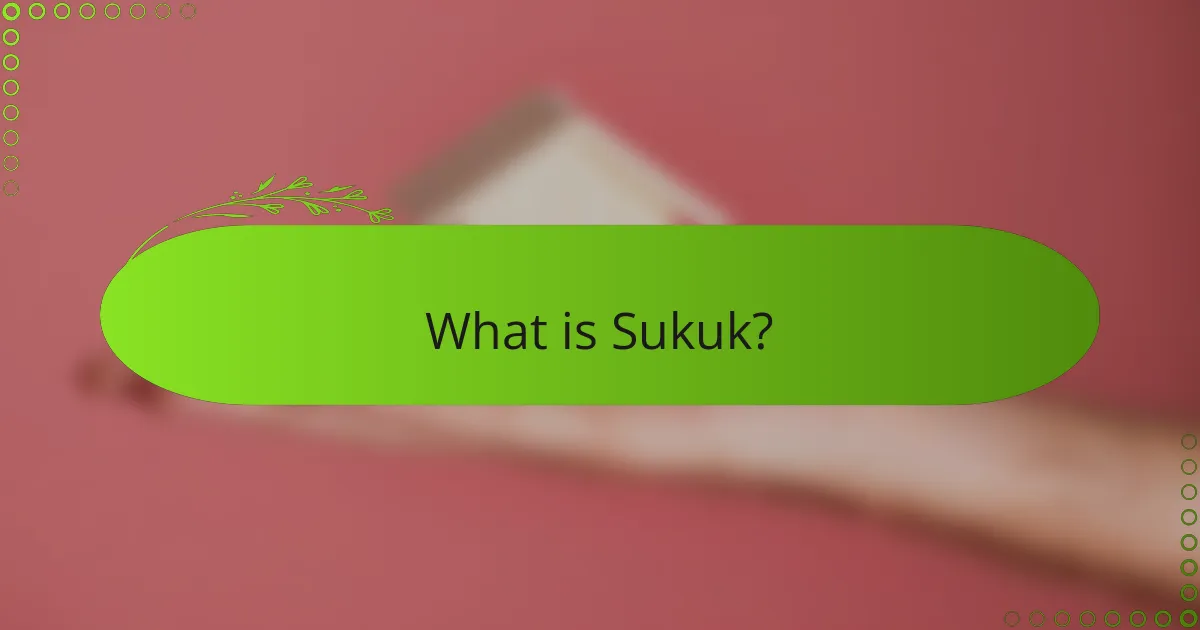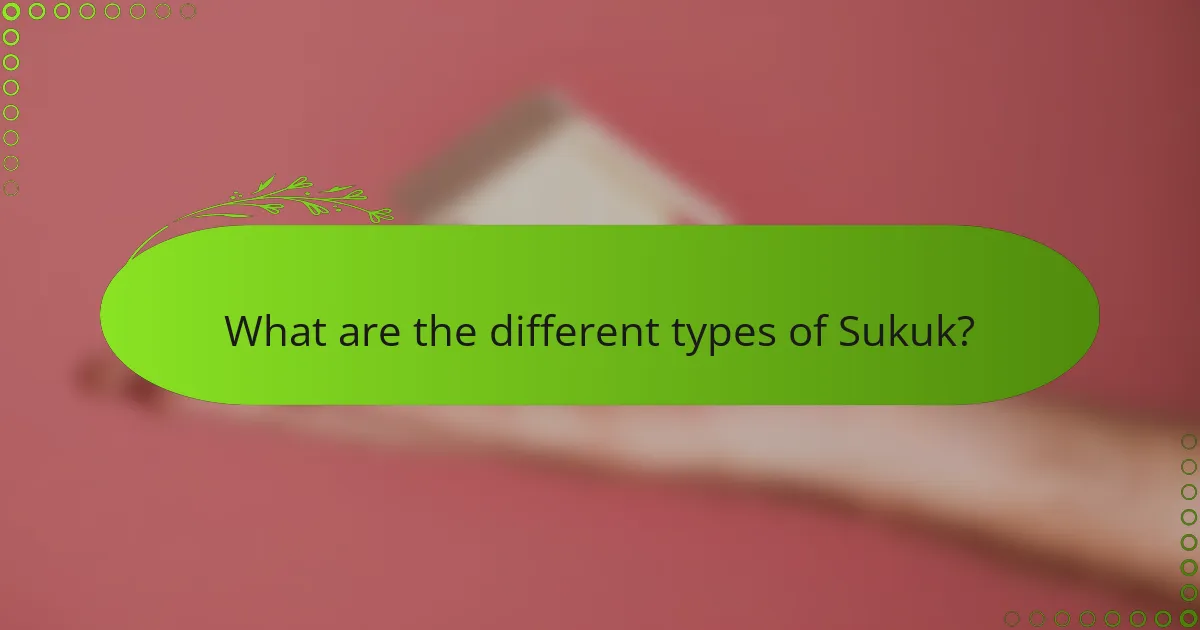
What is Sukuk?
Sukuk are Islamic financial certificates similar to bonds. They represent ownership in a tangible asset, project, or investment. Sukuk comply with Islamic law, which prohibits interest (riba). Instead of interest payments, investors receive returns derived from the underlying asset’s income. The global Sukuk market has grown significantly, reaching over $500 billion in issuance by 2020. This growth reflects the increasing demand for Sharia-compliant investment options. Sukuk can be structured in various ways, including Ijarah (leasing), Murabaha (cost-plus financing), and Musharakah (joint venture). Each structure has distinct attributes and applications in Islamic finance.
How does Sukuk differ from traditional bonds?
Sukuk differ from traditional bonds primarily in their underlying structure and compliance with Islamic law. Sukuk represent ownership in tangible assets or projects, while traditional bonds are debt instruments that obligate the issuer to repay borrowed money with interest. In Sukuk, investors receive returns based on the performance of the underlying asset, not interest payments. This aligns with the Islamic prohibition of riba, or usury. Traditional bonds, on the other hand, generate fixed interest payments regardless of the issuer’s financial performance. Furthermore, Sukuk must adhere to Sharia principles, ensuring ethical investment practices. This distinction highlights the fundamental differences in risk, return, and compliance between Sukuk and traditional bonds.
What are the key characteristics that define Sukuk?
Sukuk are financial instruments that comply with Islamic law. They represent ownership in a tangible asset or project. Sukuk generate returns to investors through asset income, not interest. They are structured to avoid Riba (usury) which is prohibited in [censured]. Sukuk can be issued in various forms, including Ijara, Murabaha, and Musharaka. Each form has unique characteristics and structures. Sukuk are often backed by physical assets, providing security to investors. They also facilitate investment in Sharia-compliant projects, promoting ethical finance.
Why is Sukuk considered compliant with Islamic law?
Sukuk is considered compliant with Islamic law because it adheres to the principles of Shariah. Islamic law prohibits interest (riba) and promotes risk-sharing. Sukuk represents ownership in tangible assets or projects. This structure ensures that returns are derived from actual economic activity. Additionally, Sukuk must avoid excessive uncertainty (gharar). The contracts governing Sukuk are structured to align with Islamic ethical standards. Consequently, they provide a lawful investment avenue for Muslims. This compliance is validated by Shariah boards that review and approve Sukuk structures.
What are the main features of Sukuk?
Sukuk are Islamic financial certificates similar to bonds. They represent ownership in a tangible asset or a pool of assets. Sukuk provide investors with a share of the income generated by these assets. They comply with Sharia law, prohibiting interest payments. The structure of Sukuk involves asset-backed financing. This ensures that the investment is linked to real economic activity. Sukuk can be issued in various forms, including Ijara, Murabaha, and Musharaka. Each type has unique characteristics and uses in financing.
How does Sukuk generate returns for investors?
Sukuk generates returns for investors through profit-sharing arrangements or lease agreements. Investors receive periodic payments derived from the underlying asset’s income. These payments are structured as rental income or profit distributions. Sukuk is compliant with Islamic finance principles, ensuring that returns are not derived from interest. The underlying assets provide tangible value, enhancing security for investors. Sukuk can also appreciate in value, offering capital gains potential. The market for Sukuk has grown, with global issuance reaching over $200 billion in recent years. This growth indicates strong investor interest and confidence in Sukuk as a viable investment.
What risks are associated with investing in Sukuk?
Investing in Sukuk carries several risks. These include credit risk, which arises if the issuer fails to meet payment obligations. Market risk can affect Sukuk values due to interest rate fluctuations. Liquidity risk is present if investors cannot sell Sukuk easily. Legal risk involves potential disputes over contracts or Sharia compliance. Currency risk affects Sukuk issued in foreign currencies, impacting returns. Operational risk may arise from management or administrative failures. Regulatory risk is linked to changes in laws governing Sukuk. Each of these risks can influence the overall return on investment in Sukuk.

What are the different types of Sukuk?
There are several types of Sukuk, each serving different purposes in Islamic finance. The main types include Ijarah, Murabaha, Musharakah, Mudarabah, and Sukuk al-Istithmar.
Ijarah Sukuk are based on leasing assets. Investors receive rental payments from the leased assets. Murabaha Sukuk involve the sale of goods at a profit margin. The profit is predetermined and disclosed to investors.
Musharakah Sukuk represent a partnership where profits and losses are shared. Investors contribute capital and share in the project’s returns. Mudarabah Sukuk are based on a profit-sharing agreement. One party provides capital while the other manages the investment.
Sukuk al-Istithmar are investment Sukuk, focusing on generating returns from specific projects. Each type of Sukuk adheres to Islamic law, ensuring compliance with Sharia principles.
How do asset-backed Sukuk work?
Asset-backed Sukuk represent a financial instrument structured to comply with Islamic law. They are essentially certificates that provide investors with a share in the ownership of an underlying asset. The asset generates income, which is then distributed to Sukuk holders. This structure ensures that the investment is linked to tangible assets, making it Sharia-compliant.
Investors receive periodic payments based on the income generated from the asset. When the Sukuk matures, the principal amount is returned to the investors. The underlying asset can be real estate, infrastructure, or other physical assets. This setup mitigates risks associated with speculative investments.
According to the Islamic Financial Services Board, asset-backed Sukuk have become increasingly popular due to their transparency and risk-sharing features. The global Sukuk market reached approximately $500 billion in 2020, highlighting their significance in Islamic finance.
What assets are typically used in asset-backed Sukuk?
Asset-backed Sukuk typically utilize tangible assets. Common assets include real estate, infrastructure projects, and commodities. These assets generate cash flows that support the Sukuk’s returns. Real estate properties can be leased to provide rental income. Infrastructure projects may involve toll roads or energy facilities. Commodities like gold or oil can also serve as backing. The underlying assets must comply with Shariah principles. This ensures that the Sukuk remains ethical and permissible in Islamic finance.
How is the value of asset-backed Sukuk determined?
The value of asset-backed Sukuk is determined by the underlying assets’ cash flows. These cash flows are generated from the income-producing assets that the Sukuk represents. Investors analyze the quality and stability of these cash flows. The expected returns are also influenced by the risk profile of the underlying assets. Market demand and supply dynamics can further affect the Sukuk’s value. Ratings from credit agencies provide additional insights into the risk and value. Additionally, the legal structure and compliance with Sharia law play a crucial role in valuation. Overall, the combination of these factors establishes the market value of asset-backed Sukuk.
What are the characteristics of Ijarah Sukuk?
Ijarah Sukuk are Islamic financial instruments based on leasing agreements. They represent ownership in a tangible asset that is leased to a third party. The lease payments provide returns to the Sukuk holders. Ijarah Sukuk must comply with Shariah law, ensuring that the underlying asset is halal. They are typically structured to minimize risk for investors. These Sukuk can be traded in secondary markets, enhancing liquidity. The duration of Ijarah Sukuk is linked to the lease period of the asset. Investors in Ijarah Sukuk receive periodic income without engaging in interest-based transactions.
How does the leasing structure of Ijarah Sukuk function?
The leasing structure of Ijarah Sukuk functions by allowing investors to finance the purchase of an asset through lease agreements. In this structure, the Sukuk holders effectively become lessors of the asset. The asset is leased to a third party, generating rental income. This income is then distributed to the Sukuk holders as returns on their investment. The lease agreements are compliant with Islamic law, ensuring that they do not involve interest. The underlying asset remains owned by the Sukuk issuer until the lease term concludes. At the end of the lease, the asset may be sold or transferred to the lessee. This structure provides a Sharia-compliant investment avenue while generating cash flow for investors.
What benefits do investors gain from Ijarah Sukuk?
Investors gain several benefits from Ijarah Sukuk. These benefits include regular income through rental payments. Ijarah Sukuk provides a predictable cash flow, enhancing financial planning for investors. The structure is compliant with Islamic finance principles, appealing to ethical investors. Investors also benefit from asset-backed securities, which reduce investment risk. Furthermore, Ijarah Sukuk can enhance portfolio diversification. The underlying assets provide a tangible value, increasing investor confidence. Additionally, tax advantages may apply in certain jurisdictions, improving net returns. Overall, these factors contribute to the attractiveness of Ijarah Sukuk for investors.

What is the role of Sukuk in Islamic finance?
Sukuk serve as Islamic financial instruments that comply with Sharia law. They represent ownership in tangible assets or projects. Sukuk provide a means for raising capital while avoiding interest, which is prohibited in [censured]. Investors receive returns based on the asset’s performance rather than interest payments. This aligns with the principles of risk-sharing and ethical investing in Islamic finance. Sukuk are crucial for funding infrastructure and development projects in Muslim-majority countries. They also enhance liquidity in the Islamic financial market. According to the Islamic Financial Services Board, the global Sukuk market reached over $500 billion in issuance by 2021, demonstrating their significance.
How does Sukuk contribute to economic development in Muslim countries?
Sukuk contributes to economic development in Muslim countries by providing a Sharia-compliant financing alternative. This financial instrument facilitates investment in infrastructure and public projects. Sukuk mobilizes savings from individuals and institutions, directing them into productive sectors. This process enhances liquidity in the financial markets. It also promotes financial inclusion by attracting a wider investor base. Studies indicate that Sukuk issuance has increased significantly, with global Sukuk market size reaching over $500 billion in 2022. Countries like Malaysia and Saudi Arabia have effectively utilized Sukuk for economic growth. These nations have funded major infrastructure developments through Sukuk, demonstrating its practical benefits.
What sectors benefit most from Sukuk financing?
The sectors that benefit most from Sukuk financing include infrastructure, real estate, and energy. Infrastructure projects often require significant capital, making Sukuk an attractive financing option. Real estate development can utilize Sukuk to fund large-scale projects while adhering to Islamic finance principles. The energy sector also benefits, particularly in renewable energy projects, where Sukuk can provide necessary funding. According to the Islamic Financial Services Board, Sukuk issuance has notably increased in these sectors, demonstrating their reliance on this financing method.
How does Sukuk promote financial inclusion?
Sukuk promotes financial inclusion by providing access to investment opportunities for underserved populations. It allows individuals and entities without traditional banking access to participate in capital markets. Sukuk structures are compliant with Islamic law, attracting a diverse investor base. This inclusivity helps mobilize funds for infrastructure and development projects. According to a report by the Islamic Financial Services Board, Sukuk issuance reached $150 billion in 2020, reflecting its growing role in financing. By offering profit-sharing mechanisms, Sukuk aligns the interests of investors and issuers, fostering economic participation. This model enhances financial literacy and empowers communities through investment education.
What challenges does Sukuk face in the global market?
Sukuk faces several challenges in the global market. One major challenge is regulatory inconsistency across jurisdictions. Different countries have varied legal frameworks governing Sukuk issuance. This inconsistency creates uncertainty for investors and issuers alike.
Another challenge is the lack of standardization in Sukuk structures. The absence of universally accepted guidelines leads to complexities in understanding and comparing different Sukuk offerings. Additionally, liquidity issues can arise due to a limited secondary market for Sukuk.
Market perception also poses a challenge. Some investors may have limited knowledge of Sukuk, viewing it as less attractive than conventional bonds. Furthermore, economic downturns can impact Sukuk performance, as they are sensitive to market conditions.
Lastly, political instability in issuing countries can deter investment. Investors often seek stable environments, and political risks can lead to higher perceived risks associated with Sukuk.
How do regulatory frameworks impact Sukuk issuance?
Regulatory frameworks significantly influence Sukuk issuance by establishing guidelines and standards. These frameworks ensure compliance with Islamic law, known as Sharia. They also dictate the legal structure and documentation required for Sukuk. Clear regulations enhance investor confidence and market stability. For instance, jurisdictions with robust regulatory environments see higher Sukuk issuance volumes. According to the Islamic Financial Services Board, regulations promote transparency and protect investors. Moreover, regulations can vary widely across countries, affecting the global Sukuk market. Countries with supportive frameworks often attract more issuers and investors.
What are common misconceptions about Sukuk?
Common misconceptions about Sukuk include the belief that they are similar to conventional bonds. Sukuk are structured to comply with Islamic law, which prohibits interest. Another misconception is that Sukuk are only for wealthy investors. In reality, they are accessible to a wide range of investors. Some people think Sukuk investments are not secure. However, they are backed by tangible assets, providing a level of security. Additionally, there is a belief that Sukuk lack liquidity. Many Sukuk are actively traded in secondary markets, enhancing their liquidity. Lastly, some assume Sukuk are only issued by Islamic banks. Various entities, including governments and corporations, issue Sukuk to raise funds.
What best practices should investors consider when investing in Sukuk?
Investors should consider diversification when investing in Sukuk. Diversifying across different types of Sukuk can reduce risk. Investors should also assess the creditworthiness of the issuer. This involves reviewing the issuer’s financial stability and track record. Understanding the underlying assets is crucial. Investors need to know how these assets generate returns. Additionally, monitoring market conditions is important. Market fluctuations can impact Sukuk performance. Lastly, investors should stay informed about regulatory changes. Regulations can affect Sukuk structures and returns. These best practices enhance investment outcomes in Sukuk.
Sukuk are Islamic financial certificates that represent ownership in tangible assets or projects, adhering to Sharia law by prohibiting interest payments. This article provides a comprehensive overview of Sukuk, detailing their key characteristics, different types such as Ijarah and Murabaha, and their role in Islamic finance. It also discusses how Sukuk generate returns for investors, the risks involved, and their contribution to economic development in Muslim countries. Additionally, the article addresses challenges in the global Sukuk market and best practices for investors considering Sukuk as an investment option.